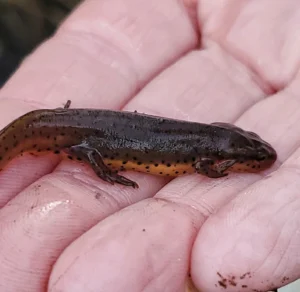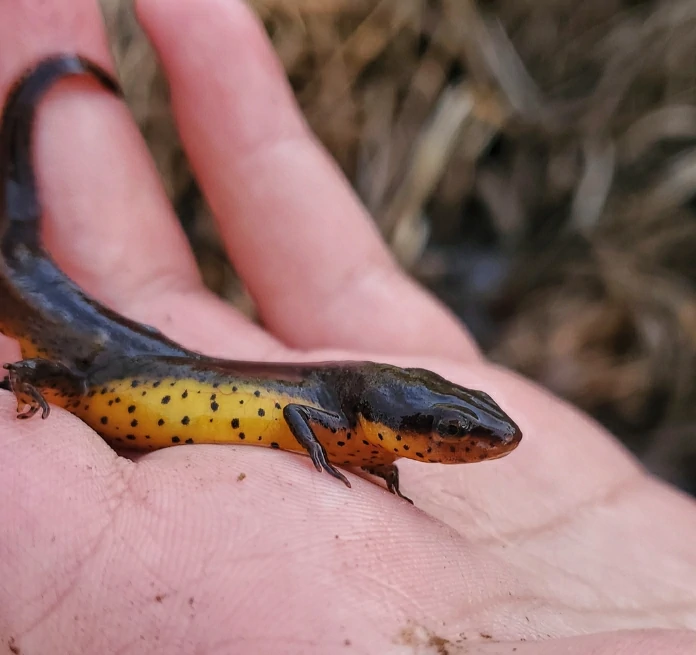Have you ever found a small newt hiding under a damp log or swimming quietly in a pond and wondered, “Can I touch it?”
Newts are delicate, and touching them usually isn’t a good idea. Their skin is thin and very sensitive, and oils, lotions, or even tiny scrapes from your hands can hurt them. If you really need to handle a newt, wet your hands first and be very gentle.
Why Newts’ Skin Makes Them Sensitive
Newts have slightly slimy, very thin skin. This helps them breathe through their skin and stay hydrated, which lets them survive both in water and on land.

But it also means anything on your hands (soap, lotion, or even bits of dirt) can irritate or damage their skin.
Think of their skin like a delicate waterproof glove. Even light pressure or chemicals from your hands can stress or harm them.
That’s why scientists and people interested in wildlife often watch newts without touching them, letting them move naturally in their environment.
When It Might Be Okay to Touch a Newt
Sometimes you have to touch a newt, like if you need to move it from a dangerous path or container.
In these cases:
-
Wet your hands first with pond water to prevent skin damage.
-
Handle gently, supporting the body without squeezing.
-
Keep contact short, newts don’t need long handling sessions.
-
Wash hands afterward to remove toxins from their skin.

Even brief contact can stress them, so touching should be minimal.
Why Newts Can Be Sensitive to Human Contact
Humans carry oils, soaps, or bacteria that can harm newts.
A tiny scratch or chemical residue can cause infection or dehydration. Newts have a natural slime layer that protects them from germs, but it’s fragile.
For example, scientists studying newts always wear gloves or use wet hands when handling them.
Even small mistakes can affect their health or lower their chance of survival in the wild.
Do Newts Bite or Defend Themselves?
Many people worry about bites. Most newts don’t bite humans. Their mouths are tiny, and they usually escape or rely on toxins to protect themselves.
Some species, like the eastern newt, secrete mild toxins from their skin.
These aren’t usually dangerous to humans, but they can irritate eyes or cause mild skin reactions.
So touching them carelessly is risky for both the newt and you.
Watching Newts Without Touching
If you want to enjoy newts safely, there are ways to watch them without touching:
-
Use a small glass container or observation jar for a few minutes.
-
Watch from the edge of the pond or stream, they often swim close to the surface or under leaves.
-
Take photos instead of handling, which keeps their behavior natural.

This lets you enjoy their smooth, slippery movements without putting them at risk.
How Touching Newts Can Stress Them
Even gentle handling can stress newts. Stress can cause:
-
Less feeding
-
Weaker immune system
-
Faster loss of slime layer
-
More danger from predators
They are tiny, delicate creatures, and what feels like a quick, harmless touch to us can feel like a big threat to them.
Tips for Responsible Interaction With Newts
If you absolutely must touch a newt:
-
Keep hands wet and clean.
-
Support its body fully, especially the tail and limbs.
-
Avoid touching the eyes or head.
-
Return the newt to its habitat gently and quickly.
Think of it like picking up a small, slippery treasure. Treat it with care, and it will stay healthy and safe.
Fun Facts About Newt Skin and Handling
-
Newts secrete mucus to stay moist and defend against germs.
-
Some species can regrow small skin injuries if handled carefully.
-
Their slime makes them slippery, so they are tricky to hold even if you try.
-
Touching too much can remove protective layers and make them more likely to get sick.
Even though it’s tempting to hold one, the safest way is usually to watch and admire from a short distance.
Conclusion
So, are newts okay to touch? Technically, yes, but only if you are very careful. Their delicate skin and natural toxins make them better for watching than handling. If you do handle them, do it gently, with wet hands, and only for a short time.
Most of the time, the best way to enjoy newts is to watch them in their natural habitat. Appreciate their smooth skin, graceful swimming, and tiny movements.
That way, you protect both the newts and yourself, and get to see their interesting behavior just as nature intended.
Hi, my name is Ezra Mushala, i have been interested animals all my life. I am the main author and editor here at snakeinformer.com.

